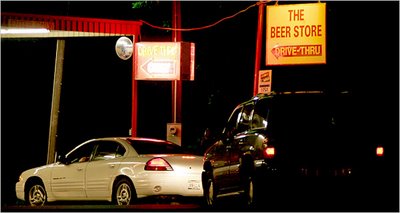Quote of the day: Battle lines are drawn in the country's remaining "dry" counties, and guess which side Wal-Mart and other businesses are on
>
 "Residents of Angelina County in Texas must travel to a neighboring county when they want to buy alcohol." (photos by Michael Stravato for the New York Times)
"Residents of Angelina County in Texas must travel to a neighboring county when they want to buy alcohol." (photos by Michael Stravato for the New York Times)“This is an unprecedented attack against the family. We are going to fight this tooth and nail." [At a rally opposing a November referendum proposal--"his rousing words greeted with cries of 'amen' and 'praise Jesus'"]

"I think Sam Walton, being the family-oriented man he was, would be rolling over in his grave about this. I’m really disappointed in Wal-Mart as a company.” [In a phone interview with NYT reporter Melanie Warner]
--the Rev. Ronnie L. Frankens (right), pastor of Homer Pentecostal Church in Diboll, Texas, about a campaign--financed by Wal-Mart and other business interests--to allow beer and wine sales in currently dry Angelina County, northwest of Houston
It seem that that the hearts and minds of residents of 415 counties in the South and in Kansas that currently don't allow the sale of alcohol have become a battleground:
Since 2002, business groups have spent upwards of $15 million on campaigns, including professional lobbyists, to persuade voters in some 200 dry towns and 25 dry counties in six Southern states to legalize alcohol sales in stores and restaurants.
Wal-Mart has financed dozens of local elections, contributing from $5,000 to $20,000 a campaign, said Tim Reeves of Beverage Election Specialists, which supports local alcohol referendums.
Wal-Mart, based in a dry county in Arkansas, forbids drinking at events held at corporate headquarters. But the giant retailer has made a push in the last year to sell more liquor, along with beer and wine, in its stores.
It's hard to pick sides here--between dry-forever religious groups intolerant of alcohol use by fellow citizens who don't share their views (reporter Warner quotes a retired forest worker in Lufkin, Texas, at 35,000 the largest town in Angelina County: "This is the 21st century. I just want to be able to buy my case of Coors Light, come home and pop open a cold one") and business interests intolerant of this limitation on their ability to make a buck.
Between them are local residents being swayed by arguments:
• For an upturn in businesses locating in their area and a boom in incoming tax revenues
• Against the sure-to-follow upsurge in immorality, drunkenness and debauchery
There are aguments both ways as to how real the economic benefits are, and also how real the threat of rampant alcohol-fueled drunkenness and debauchery is. (For one thing, these "wettenings" have generally allowed for only retail and restaurant sales, dens of iniquity like bars, nightclubs and liquor stores being apparently too iniquitous to contemplate.)
So far, more dry-to-wet conversions have been approved than rejected. Says John Hatch, an Austin political strategist who has worked on the issue,"The communities who effectively make arguments about economic development and tax dollars typically win the votes."



1 Comments:
Mesquite is going through the same thing. What BEST and TPS is illegal! There is no congressional oversight as these men run around getting their way on behalf of corporations in Texas. The ones who lose are homeowners and school districts.
I am following our story on my site
www.friendsofmcwhorterpark.com
Post a Comment
<< Home